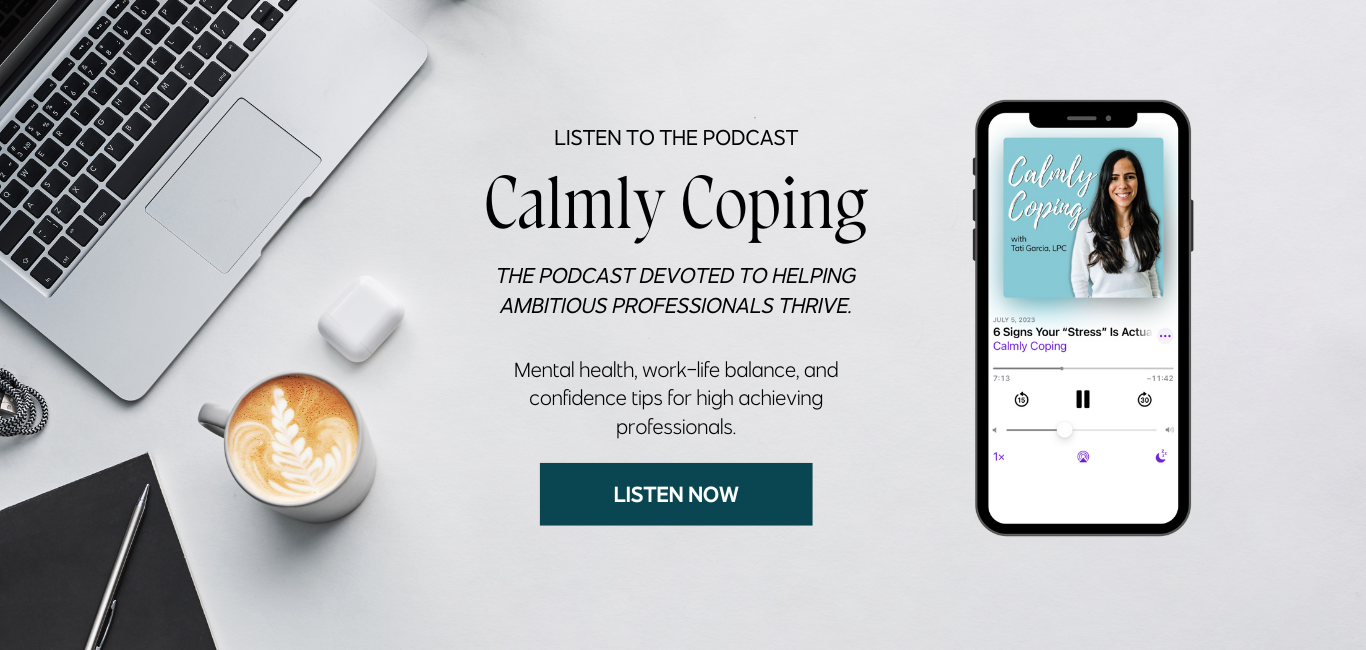This episode we’re diving into a crucial skill for any high-achieving professional: delegation. If you find yourself overwhelmed and stressed with too much on your plate, this episode is for you. I’ll be sharing practical tips on how to delegate effectively to free up your time and reduce stress.
In this episode, you will learn:
- 3 key steps to systemize your tasks before delegating them
- How to leverage tech for delegation
- How to master the art of constructive feedback
LISTEN NOW:
🎧 CLICK HERE TO LISTEN TO CALMLY COPING WHEREVER YOU LISTEN TO PODCASTS
WATCH NOW:
🖊️ Join the waitlist for my 1:1 services: Waitlist
💬 Submit a message, question, or suggestion to the podcast: Message
FREE TRAINING: Achieve A Calm Mind, Balanced Life, & Empowered Confidence in 90 Days
If you want to learn how to take back control of your life so you can feel calmer and more confident, and learn the tools to spend your time according to what matters most to you (no matter what your schedule is like right now)…

LISTEN, REVIEW, AND SUBSCRIBE TO THE PODCAST!

INTRO/OUTRO MUSIC: Rescue Me (Instrumental) by Aussens@iter (c) copyright 2018 Licensed under a Creative Commons Attribution (3.0) license. http://dig.ccmixter.org/files/tobias_weber/57990 Ft: Copperhead
DISCLAIMER: All content here is for informational purposes only. This content does not replace the professional judgment of your own mental health provider. Please consult a licensed mental health professional for all individual questions and issues.
Interested in diving deeper to get support for high-functioning anxiety?
I offer 1:1 coaching to help high-achievers overcoming high-functioning anxiety so they can feel calmer, more present, and have improved balance in their lives. Click here if you’re interested in learning more and getting started.
Calm, Balanced, & Confident is my comprehensive A→Z self-paced course to help high-achieving professionals overcome high-functioning anxiety so they can feel calmer, balanced, and more confident without the anxiety and overwhelm. Click here to learn more and enroll today.
Looking for ongoing support and guidance with high-functioning anxiety? The Calm & Ambitious Community is the exclusive community for high achievers with high-functioning anxiety. Click here to learn more and join us today!
TRANSCRIPT:
Click to view the episode transcript.
Today, we’re diving into a crucial skill for any high achieving professional delegation. If you find yourself overwhelmed and stressed with too much on your plate, this episode is for you. I’ll be sharing practical tips on how to delegate effectively to free up your time and reduce stress. Let’s get started.
Welcome to calmly coping. I’m your host, Tati Garcia. I’m a licensed therapist and a high functioning anxiety coach. Calmly Coping is the podcast for people who struggle with anxiety and high functioning anxiety. Each Wednesday, you’ll hear informative episodes with actionable tips about decreasing anxiety, adopting a healthy mindset, and managing your time and energy so you can live a calm and balanced life.
Let’s get started. Thank you so much for tuning in. Delegation is super important and sometimes there can be a lot of resistance to it when you’re high achieving because you might have the belief that well nobody can do it as well as I can do it. There can be a fear of letting go of control and not having so much of an oversight of what’s happening and putting into somebody else’s hands.
And there can also be resistance when it comes to the upfront work that people believe is often necessary to to delegate. It can feel like a lot more to do up front rather than just I’ll do the things rather than having to teach somebody else how to do it. And these are concerns that I’ve heard from a lot of my clients when it comes to delegating and actually taking the steps to free up their own time and not just time but their own stress their own peace of mind because when you’re keeping a task on your plate that is mental energy that that is taking up for you whereas if you can effectively delegate and give this task and hand it off in a systemized way that is going to be clearly explained for the person who you are giving the work to and then you can have the initial phases of feedback and trust in this person to take on this responsibility then that can really free up a lot of mental space in your mind.
So let’s get into the tips. If you’re somebody who struggles with delegation, or you’re wanting to start delegating, and this is specific to work, but this can also apply if you’re delegating in any situation, you might just kind of want to tweak it here and there. Because if you’re delegating your personal life, it may not be as kind of structured and systemized as it would be at work.
So first, I mentioned this a few times, this word, but is systemize your approach. So this is something that I learned when I first started delegating. And there are three categories when it comes to systemizing an approach to ensure effective delegation because a big part of delegation is communicating what your expectations are in an effective way, in a clear way that the person that you’re delegating to can fully understand what it is that you want to do.
And you can start and. actually do this. And this is something that I have done many times. I think probably every time that I’ve delegated is to start making these process while you’re doing the task yourself. So for example, you might record yourself going through the task. while you’re already doing it, and this is you freeing up that time from having to train somebody.
Maybe you can do a screen recording of you completing the task, especially if it’s something that is digital, but even if it’s something that’s not, maybe you can take your phone camera and film yourself doing something that is more of an off the computer task. But I digress. So, those three categories are vision, resources and definition of done.
This is something that I’ve actually created a template for my virtual assistant because this is what I will share with her when I am delegating tasks to her. And for each task, I identify, okay, what’s the vision? What is my idea for what this task is? What do I want it to look like? Are there any pictures that I can share or anything that I’ve already done that gives her an idea of what to do?
So this can also include things like my branding or templates that I’ve used if it’s social media content or anything else that’s applicable. The next category is resources. So this can include any sort of resources that the person might need. So maybe they need a login for an account or an application or a program or a template.
So this is really going to be specific to what it is that you’re showing them. A resource could also include this training video that you created and anything that’s going to help them to get the work done. And then a definition of done is number three. And this definition of done is essentially what is your definition of what this looks like when it’s complete?
Are there any criteria that need to be met? Is there anything that you need to ensure like a deadline that needs to be met or anything else that applies to that thing? So that’s vision resources definition of done. I have found that this is a really effective way of delegating tasks. That doesn’t have to be super involved and doesn’t have to be very time consuming because this is really something that can be done while you’re already completing the task.
It might add a little bit more time, but ultimately what can help is what I’m going to be discussing further down the process is the feedback, the iteration, because a lot of times there can be this idea that this needs to be perfect up front. And although it can be helpful to have it at least meeting your criteria, it doesn’t mean that it cannot be changed.
So this is about having kind of a rough first draft. But I also highly recommend delegating tasks that you have already been doing yourself, that you know is something that needs to be passed on to somebody else at this time. Unless, of course, you’re in the kind of company where you’re being told, okay, this needs to go to this person, that’s a different thing.
When I’m talking about delegation, in this sense, I’m talking about taking things off of your plate. So if it’s something you’ve already been doing, you’re most likely familiar with the process and can complete all this information to then pass it on to another person. Tip number two is to leverage technology.
So nowadays, technology can be super helpful in delegating, especially if it’s work that involves the computer. So I already mentioned doing like a screen recording if you are completing a task to pass this on to the person you’re delegating to. You can also create and use templates for repetitive tasks.
I have a template for each podcast episode because my virtual assistant helps me to schedule them and put everything out there. And so I will go in once a week and put in all of the information that she needs in order to get things out there. I will transcribe the episode, I will identify the keywords, I will put in the description, and then she just, puts it out to everywhere that it needs to go and although that is a little bit of time up front for me, it is in the long run saving me a lot of time and having this template I use notion and so I just click a button and the template already populates that in and of itself already saves a lot of time from having to constantly recreate the same things over and over again. And this can be not just helpful for delegation, but in just your day to day work, creating things that if it’s a repetitive process, having templates or having systems to help you to free up not just time, but mental space and energy from having to repeat the same tasks over and over again.
And this brings us to my next tip, which is to automate whenever possible. So this is kind of in a way different from delegation because you’re not necessarily giving a task to somebody else, but you’re giving a task to automation, to technology. It’s really going to depend on what field you’re in. But for me, this can look like email auto responders.
So if somebody signs up for one of my products or courses, they’re automatically getting an email and getting onboarded. So I don’t have to do that every single time. That is freeing time and energy off of me. It can also look like scheduling. You know, if you’ve ever been in a situation where you’re going back and forth via email, trying to schedule an appointment, maybe using something like Calendly or whatever scheduling app you want to use can help to free up a lot of that time and energy where you can just automate things, have your availability there and send your calendar link over and simplify things. All of those things are ultimately going to help you to free up time and like I’ve mentioned a million times before in this episode, free up stress and mental energy in space. My next tip applies to delegation that I kind of hinted at before and that is providing constructive feedback because delegating isn’t always a one and done process.
It definitely can be, especially if you maybe have been working with somebody for a while or they already are familiar with what they have to do. But if this is a task that’s new to the person, then there can be a learning curve and that’s okay. You know, I’m sure when you first started learning something new, there was a learning curve as well.
And this is when providing constructive feedback can be super valuable. I find that it is especially important to provide positive feedback, especially when it applies and providing that consistent positive feedback can help to reinforce the the individual’s work and it can also help when you’re giving constructive criticism for them not to feel like, well, they’re always pointing out negative things and what I’m doing wrong, but never what I’m doing right.
Because if you’ve ever experienced that before, I know I have, then it can be really discouraging. But when you have that balance of, and actually erring more on providing positive feedback, which a lot of times people forget to do, then that can put you in a place to feel more comfortable providing any sort of constructive suggestions.
And one thing that I’ve learned that can be helpful is the sandwich of feedback. So you say something positive, then you say a suggestion, and then you say end with something positive. And so this can look like, I really liked what you did with x, y, and z here. I did notice that this could be improved in this way.
Overall, I think you did an excellent job. So it’s all about communicating clearly what your expectations are up front and then iterating the process. through providing feedback. And then the next time the person does the thing, then you can get a sense of, okay, they were able to follow through with these things I suggested or they didn’t.
And then that might potentially be another opportunity for a conversation or to explore what’s getting in the way. Why isn’t this being met in this way? However, if you are having this upfront conversation and being clear about your expectations and providing feedback along the way, then it might be a little bit more time consuming up front, but really in the long run, I guarantee you it is worth it.
Especially in my experience, I delegate when it comes to my virtual assistant helps with my social media and podcast scheduling. And I have an editor who is watching this now. Thank you, Bree. And she helps with editing my episodes and that frees up so much time, space and energy for me so that I can really focus on the work that I enjoy the most and also business wise so that I can focus on the work that is going to bring in income rather than spending my time on tasks that somebody else can do better and that I can then have more free time to do the things that I enjoy more.
So there are benefits to delegation. Sometimes it can be a learning curve and it is a skill that can be learned and I promise it’s something that can become easier the more that you do it. It can help to free up a lot of stress, anxiety, pressure, and frustration that you feel because you don’t have to do it all on your own.
And it doesn’t have to be perfect 100 percent of the time. It’s okay to let go of control because ultimately that can allow you to do more of the work that you love or to help you to spend your time in the way that you want, whether that is with your loved ones or on hobbies or however you want to.
Like I mentioned before, this is something that I have helped a lot of my clients with when they have struggled with letting go of control and they want to improve their work life balance and confidence and sense of calm through delegation. If this is something that you’re looking for support with, you can sign up for my waitlist to work with me and get notified as soon as I have openings.
You can go to calmlycoping.com/waitlist to learn more and sign up. And I’d love to hear your thoughts on this episode. If you’re watching on YouTube or listening on Spotify, you can leave a comment letting me know how you feel about delegation. And if there are any steps that you want to take after having checked out this episode to help you to delegate while you wait for next week’s episode.
I have other episodes about calming your mind, improving work life balance and feeling more confident from within. Thank you so much for tuning in today and until next time, be calm. Thanks so much for listening. If you like what you heard, please share this episode with a friend and please subscribe and leave me a review on iTunes.
Also, remember to check me out online at CalmlyCoping.com and connect with me on Instagram at TatianaGLPC. All content here is for informational purposes only. This content does not replace the professional judgment of your own mental health provider. Please consult a licensed mental health professional for all individual questions and issues.
Till next time, I’m Tati, and this has been Calmly Coping.


Until next time…













